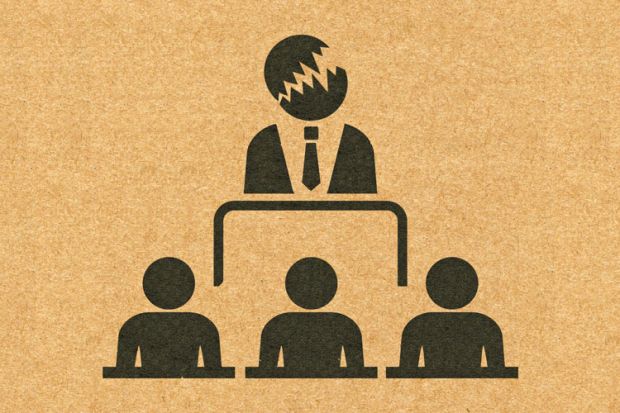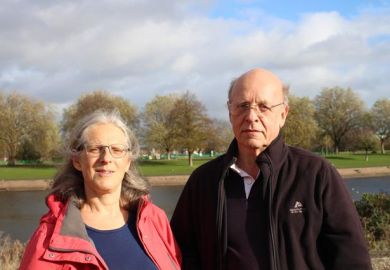For a couple of years now, commentators in both the US and the UK have complained that students in higher education are becoming worryingly fragile. Coddled and hypersensitive, they allegedly spend their college years hiding from scary ideas.
In a recent article in The Atlantic, Greg Lukianoff, president and chief executive of the Foundation for Individual Rights in Education, and Jonathan Haidt, Thomas Cooley professor of ethical leadership at New York University, say that this approach is putting students’ education, and even their mental health, at risk. For their own good, the commentators argue, students urgently need to stop looking out for themselves and to hand control back to institutions and professors.
In 2014, the debate in the US on this subject centred mainly around “trigger warnings” – notices meant to inform students in advance about violent, horrific or damaging content in classroom material. By asking for such warnings, students forced academics to consider what effects the material they select might have on people with backgrounds and experiences different from their own. Some professors complained that it was easier just to avoid all remotely contentious material. But, of course, our established cultural canon is littered with torture, rape, misogyny and racism. Teaching it beyond the exclusively white, male classrooms in which it was formed has turned out to require a new approach, in which the beneficent effect of classic literature is not just taken for granted. We might call that sensitivity. We might also call it critical thought.
Trigger warnings, or at least the row about them, never became such a big deal in the UK. Here, the focus of attention of those concerned about “coddled students” has principally been on student activists’ attempts to disrupt speakers they disagreed with. Recently, feminist writer Germaine Greer threatened to cancel a lecture at Cardiff University after students started a petition condemning her “misogynistic views towards trans women” (although the lecture ultimately went ahead). When an anti-abortion group at Christ Church, Oxford invited two men to debate abortion on campus a year ago, it was the college that cancelled the event after student protests. Journalist Brendan O’Neill, who was supposed to speak for the pro-choice side, wrote in The Spectator that the protesters were “bereft of critical faculties and programmed to conform”. The article, “Free speech is so last century. Today’s students want the ‘right to be comfortable’”, went on to say that students were being “rebranded as fragile creatures, overgrown children who need to be guarded against any idea that might prick their souls or challenge their prejudices”.
But that description doesn’t fit Niamh McIntyre, one of the student activists who protested against the debate. “I don’t think students today are fragile,” she tells me. “On the contrary, we’re more committed to rooting out pervasive sexism, racism, homophobia and transphobia, which actually takes a lot of strength. This generation of students and activists is standing up and saying that, for too long, men have spoken over women, trans and non-binary people, just as white people have spoken over people of colour. In some cases, they should shut up and listen. And sometimes, to the horror of certain academics and professional narcissists, this involves rethinking the right to speak at all times, for all people, on any topic.”
Opposing campus speaking invitations has also been part of the US debate after student demands for the cancellation of a series of high-profile commencement speeches, including those by Condoleezza Rice (the US secretary of state under George W. Bush, who was scheduled to address Rutgers, the State University of New Jersey) and Christine Lagarde (managing director of the International Monetary Fund, due to speak at Smith College, a women’s liberal arts college in Massachusetts). In their Atlantic article, “The Coddling of the American Mind”, Lukianoff and Haidt argue that by caving in to such demands for “disinvitations”, universities “will have reinforced the belief that it’s okay to filter out the positive”. After all, these women “could have been seen as highly successful role models for female students”. Shouldn’t that success be more important than the policies and ideas they stand for? Students should avoid focusing on speakers’ supposed failings, just as they should complain less about the misogyny, racism and class prejudice in the films and literature they are asked to study.
One thing that critiques of modern students have in common is a recognition of the shifting balance of power between students and faculty. A widely read article in Vox this June, “I’m a liberal professor, and my liberal students terrify me”, exemplifies the growing sense that academics no longer dominate their own classrooms. This is partly a result of the increasing precarity of academic employment. But students have also found new ways of asserting themselves, especially by using the internet. As unions are in the factory, so social media can be on the campus: an organising tool against authority, linking together voices that are otherwise marginalised and disconnected.
Read more: White, Western and male? Prepare to be told off for writing a poem
Such tools would be useless, however, if students didn’t know what to do with them. Critics assert that modern students are losing their powers of critical thinking, but what we are actually seeing is that power in action: students are using their critical faculties to uncover structures of power in their own academic and social environments. They are clearly recognising that discourse and ideas can be powerful, and that is precisely why they struggle to reshape the discursive terrain, to change the conversation in ways that further their political and moral commitments. Humanities professors should be proud.
This is what’s so odd about the language of coddling and hypersensitivity. If students are really so fragile, if they’re really hiding from scary ideas in a thoughtless cocoon of political correctness, why are they so often to be found out on the campus, demonstrating, protesting, petitioning and organising? That’s not what hiding looks like. It’s not what coddling looks like. In fact, the people showing greatest signs of coddling are those professors for whom the classroom has been a safe space for way too long. Now they’re apparently afraid that their “small or accidental slights”, as Lukianoff and Haidt put it, are going to get pounced on. They’d much rather students “question their own emotional reactions” than question the assumptions coming from the front of the classroom.
Lukianoff and Haidt’s Atlantic article distinguishes itself from similar jeremiads by drawing a strong parallel between modern students’ behaviour and a series of “cognitive distortions” symptomatic of mental illness. So when the authors suggest that students should stop being so sensitive and end their protests and demands, they present themselves as doing so in the students’ own interests. While the problem they identify is “vindictive protectiveness” on the part of students, their own position is plain old protectiveness.
For example, Lukianoff and Haidt point out that if you have a phobia of elevators, simply avoiding lifts is no way to deal with your problem. Instead you need to “take your cues from Ivan Pavlov” and try exposure therapy. The same is true with trigger warnings, they say. “Classroom discussions are safe places to be exposed to incidental reminders of trauma.” But classrooms are safe places for the critical analysis of language and ideas only if we actually make them so. And that’s exactly what trigger warnings are supposed to help accomplish. You wouldn’t shove your elevator-phobic friend into an elevator and hope for the best. Taking proper account of her perspective and helping her might even teach you something about lifts that you didn’t know before.
In his Spectator article, O’Neill describes student protesters’ goal as creating “places where no student should ever be made to feel threatened, unwelcome or belittled”. That’s a goal all universities and professors should share. It’s hard to see why they wouldn’t. When commentators assume that classrooms and campuses are already safe spaces, or, conversely, that safety doesn’t really matter, they’re ignoring the experiences of marginalised people, including the disabled, ethnic minorities and women, who face threatening, unwelcoming and belittling behaviour all the time. When these people and their allies fight back and assert their own rights over the spaces they live in, that’s not “vindictive protectiveness” – it’s politics.
The Oxford abortion debate and the furore over Greer are far from the only examples of this in the UK. Student protest led to the temporary disbandment of the London School of Economics’ rugby club last year after it published a leaflet full of homophobic and misogynistic slurs. Anti-fascist activists delayed and disrupted French National Front leader Marine Le Pen’s speech at the Oxford Union. Campaigners against rape culture saw the pop song Blurred Lines banned from students’ unions across the country. And campaigns such as Rhodes Must Fall and Why Is My Curriculum White? continue to pressure universities on issues of race, diversity and inclusion.
US student activists have chalked up similar achievements in recent years, and not only with their “disinvitation” campaigns. Protests against rape culture, misogyny and racism have galvanised student activists and brought the struggle of marginalised groups to the forefront of campus life. Last month, for example, Timothy Wolfe resigned as president of the University of Missouri system following student protests, including an eight-day hunger strike, against the racist atmosphere that students said he had allowed to persist on campus. White House press secretary Josh Earnest said the Missouri protests showed how “a few people speaking up and speaking out can have a profound impact”.
The academics and commentators who complain about student protest usually lay claim to the same broad ideological ground as the protesters themselves. Some, like Lukianoff and Haidt, think that campuses are “generally left-leaning” and that universities should make “a greater commitment…to the assembly of a more politically diverse faculty”. But mostly, they too think that racism, sexism and rampant inequality are wrong, that women should control their own bodies and that everyone should be free from harassment, violence and discrimination. So what worries them so much about the students who stand up for those ideals? It used to be that academics themselves controlled the expression of those values. In a formal public debate, everyone knew just who held authority. That’s changed, and that’s what unnerves the critics.
Brendan O’Neill, this time writing for the Daily Mail, recently branded student protesters “the new fascists” after a successful student anti-racist campaign to take down a promotional video for the University of Cambridge featuring the historian David Starkey. O’Neill’s shrill catastrophism is primarily a good way to sell papers, but it does draw on a broader sense that power on campus has shifted away from middle-class, middle-aged, white men.
Especially online, professors can feel vulnerable, even bullied. “There’s been a sense in recent years”, one University of Cambridge academic tells me, “that there is a real danger to opening certain kinds of questions, and raising certain kinds of ideas, because some individuals may come after you personally for that, and accuse you of things you have not done or said, and insist on the blanket acceptance of certain highly moralised – and in many cases, quite seriously under-thought – points of view, the questioning of which is simply beyond the boundaries of permitted enquiry.” The policing of those boundaries was once firmly in the hands of university authorities. Now there’s a struggle going on that might involve hurt on both sides. Deepening divisions and mistrust between students and academic staff undermine the way teaching and learning is expected to work.
It could be, in fact, that the traditional model of the university just isn’t compatible with this newly empowered, student-led politics of social justice. It was a model forged, along with the canon, in a world where white male supremacy and class hierarchy were rarely questioned. The university was built for future beneficiaries and leaders of that system. There is a lot of work to be done reimagining and reconstructing it. What should give us hope, though, is the fact that, right now, universities are places where young people are teaching each other the arts of solidarity, critique and resistance. In an era of encroaching climate disaster and prolonged economic stagnation, prospects for the young are increasingly bleak. Those who approach the world around them with a critical sensitivity, those who are ready to stand up and fight, will be the ones who make a better world for their own and for future generations.
Tom Cutterham is the Cox Junior Fellow at New College, Oxford.
Rough passages ahead: eschew specific warnings for general awareness
A student at our institution recently had to abandon her dissertation on the American philosopher and gender theorist Judith Butler after becoming depressed by the reflections on her own life that Butler’s theories had inspired. This is the kind of case that has sparked recent debate, especially in the US, about whether students should be given “trigger warnings” before being exposed to potentially upsetting material – thereby giving them the option of avoiding it.
But our student’s reaction had not been anticipated by the supervisor – and that, say critics, is one of the big problems with trigger warnings. In 2011, we undertook a research project, funded by the Higher Education Academy, on teaching sensitive subjects in Classics. We also solicited views from other disciplines that we thought would face similar issues, such as psychology, the arts therapies, criminology and education. Our initial assumption was that the subjects students might find most difficult were those involving sex, violence and death. But it was pointed out that different individuals’ particular experiences might generate a difficult atmosphere in a class discussion no matter what the topic. An example was a warm-up exercise in an arts therapy class that asked students to close their eyes and imagine themselves on a beach, listening to the waves. For one student, this triggered the memory of the last time she heard her boyfriend’s voice – calling her name as he was being pulled out by the current after they had gone for a swim in the moonlight.
Sometimes, of course, it is easier to predict that material might provoke adverse reactions. However, there was agreement among our interviewees that it was an essential part of a university education to present challenging material that was relevant to the curriculum. Some academics go so far as to deliberately shock their students in order to challenge their unexamined assumptions and perspectives. One classicist described a session in which he showed new students the Eurymedon Vase, which shows a young Greek man making an aggressive sexual movement towards a bent-over Persian. The students’ laughter at seeing this died away when they were then shown an image of US soldiers laughing over the naked bodies of Iraqi prisoners. The lecturer used the images to explore rape as a metaphor for military domination.
Many people we interviewed said that they strove to give trigger warnings. However, one psychologist worried that drawing attention to the potential for trauma could result in a “placebo effect”, causing more students to be traumatised than otherwise would have been. He suggested that there was a need to stress that it was also fine not to be affected.
Our conclusion is that it is best to prepare students for what they might expect in their studies in general, rather than to attempt to give them specific trigger warnings. There also needs to be university-wide collaboration on supporting students who have experienced traumatic reactions, including the offer of welfare and counselling services. But all individual academics, across all disciplines, also need to be trained to deal with adverse reactions to their teaching material – however innocuous it might seem.
Susan Deacy and Fiona McHardy are principal lecturers in Classics at the University of Roehampton.
POSTSCRIPT:
Print headline: It's not students who feel threatened
Register to continue
Why register?
- Registration is free and only takes a moment
- Once registered, you can read 3 articles a month
- Sign up for our newsletter
Subscribe
Or subscribe for unlimited access to:
- Unlimited access to news, views, insights & reviews
- Digital editions
- Digital access to THE’s university and college rankings analysis
Already registered or a current subscriber?




